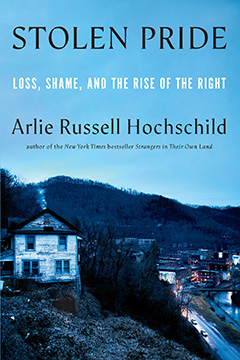If you are wondering why half of America drank the Trump Kool-Aid on election day last November, sociologist Arlee Hochschild offers some answers that go deeper than the obvious ones (religion, poverty, prejudice, ignorance). To uncover them she sets out to explore the mindsets of Appalachian residents in eastern Kentucky, sometimes disparagingly called Hill Billy country, scene of the notorious Hatfield-McCoy feud more than a century ago.
In Strangers in Their Own Land: Anger and Mourning on the American Right published almost 10 years ago, Hochschild revealed why Louisiana’s working-class white population willingly allowed the destruction of their own backyards. They found they had been duped by the state and local politicians they trusted who were in lockstep with oil and gas promoters in promising much and delivering nothing but misery and devastation through fracking.
Using the same empathetic fact-driven method she now turns her sharp investigative eye on another enigma of American political life, the new rise of Donald Trump as the 47th president of the United States. The book was released as Trump was re-entering the White House after a victorious election that gave him a trifecta of power. Coupled with Republican majorities in the House and Senate and his appointment of conservatives to the Supreme Court, he now has initiated what appears to be a reign of revenge on his political opponents and high-level public officials.
Among them are retiring FBI director Christopher Wray, resigned prosecutor Jack Smith and Republican Trump critic Liz Cheney. These public figures and others have been guards against Trump’s worst excesses. Now, following the January 20 inauguration, we are witnessing the plan of vengeance, mapped out in Project 2025, that has been unleashed by those Kentucky voters and millions of others.
Hochschild places these citizens under an unrelenting microscope in an attempt to fathom their reasons for being so completely behind a twice impeached convicted felon. Why do they seem to revere, even adore, a man once charged with trying to overthrow the Joe Biden presidency by inciting the January 6, 2021, attack on Capitol Hill in Washington, D.C.?
Hochschild’s exploratory method is to get inside communities that might normally forbid an outsider to go beyond Main St. and into the “small churches, hillside hollers, roadside diners and Narcotics Anonymous meetings.” It is there that she will seek to reveal the raw truth behind the Trump victory.
She does this as a genuinely curious outsider and by taking her time, several years in this case, she slowly gains the confidence of blue-collar workers, former junkies and small-time drug dealers, local politicians, a reformed Ku Klux Klan member, and others who are part of the growing radical right. Many of them see Trump as a kind of saviour, even a Christ figure.
Throughout much of the first two parts of the three-part book, Hochschild encourages us to follow her research trail as the story builds to a possible violent climax. Tension mounts as we wait for a proposed white nationalist march being organized by Mathew Heimach, a neo-Nazi who has been fashioned as a successor to national KKK leader David Duke.
Heimach sees potential for success in Pikeville with Pike County voting 80 per cent for Trump in 2016. The march was scheduled for 2017. Many citizens confirmed their MAGA status with majority votes for Trump in 2020 and 2024. This is part of Trump’s famed base. Moreover, the various people Hochschild interviews pledge to defend Trump regardless of his numerous flaws. In fact, they view his flaws as akin to their flaws. He is seen as bearing their shame and promising to restore their stolen pride.
Heimach hopes former police officer Roger Ford will support his march into the normally peaceful Pikeville streets and on the surface his hope is justified. Ford is a 53-year-old MAGA-cap-wearing Church of Christ minister who led a pro-Trump caravan in 2020. On his Facebook page, he describes himself as “Kentuckian by birth, Southern by the grace of God, Freemason and Shriner.” Hochschild adds that he is “pro-life, pro-gun, pro-police, anti-tax, anti-public schools, pro-wall, anti-affirmative action and anti-regulation.”
Other incentives include march participants like Wyatt Blair, a KKK member who says he’s “distantly related to the McCoys” and other right-wing activists who openly celebrate Hitler’s birthday, carry high-powered weapons and advocate hate. Heimach plans to mobilize that hate to “erase shame from you and seamlessly divert your shame to blame.”
The march will blame “Jews, Muslims, Blacks, immigrants, liberals, and Democrats,” he explains to Hochschild. Heimach is mentored by his friend Jeff Schoep, once leader of the largest neo-Nazi organization in the U.S.
Defending the town against the impending mayhem are a Jewish refugee from the Second World War, a beloved Muslim immigrant doctor nicknamed Dr. Budgy, and city manager Donovan Blackburn. They see themselves as the city’s protectors against what became a warm-up act to the violent Unite the Right march in Charlottesville, Virginia, in 2017.
Joining them was Andrew Scott, two-time mayor of nearby Coal Run. Hochschild describes him as anti-Black Lives Matter, anti-Antifa and “a firm low-tax low-spend Republican.” Also aboard is Paul Patton, born poor but having risen to great heights as former governor. “Like Kentucky-born Abraham Lincoln,” Patton “had climbed his own ninety-nine steps to the American Dream,” and along the way promoting improved education as a pathway for others.”
African American resident Ruth Mullins, a retired civil servant, was staying clear of the march along with the community’s other Black women all of whom planned to lock their doors when Neimach’s marchers came through town. Mullins recalled earlier times when racism was a more serious threat. Joining her was John Rosenberg who was reminded of the Holocaust. “We don’t want to forget these things,” he told Hochschild. “They could happen again.”
Based on repeated interviews with these and several other Pikeville people, Hochschild developed a thesis guided by the one-two punch of shame and pride. The book shows this combination at the heart of Trump’s appeal. He has carefully devised a pattern in his wandering, sometimes incoherent speeches and his outlandish behaviour that is designed to capture the sympathy of an electorate that has been shunned or dismissed by mainstream society.
David Maynard perhaps best described the dilemma for poor whites.
“The only narrative I have tells me that I’m white, so I’m privileged,” he told Hochschild. “That’s the something I have and that must put me ahead. But what if it doesn’t put me ahead. I’m not left with nothing because of racism. I’m left with nothing because I’m lazy and stupid. There’s no excuse. If you are white and poor, people think, ‘What’s wrong with you that you’re stuck at the bottom?’”
In her final chapter, Hochschild focuses more intensely on Trump, specifically his appeal to people with whom he has nothing in common yet has subtly won over.
“A lot of people think Donald Trump is highly self-centered, a narcissist, and he is,” Roger Ford explained. “But when he’s running for us, that’s to our advantage.”
What others saw as disqualifying character flaws could be useful in Ford’s view and others shared it.
When Trump was inaugurated on January 20, he immediately pardoned 1,600 criminals who had in 2021 rampaged through the Capitol building in Washington, D.C. Although charges of treason were laid against Trump for encouraging the insurrection, his election stopped the proceedings and the prosecutor resigned. Hochschild doesn’t say if anyone from Pikeville participated, but it seems possible.
The march did not go as Heimach had hoped. His plan was to “shock the town with the appearance of muscle.” But as the outside crowd left town, “out of a car window flew a single concussion grenade, which failed to explode, much like the march itself.”
The concluding chapter takes us to the present, seven years from the Pikeville white supremacy march. Oxycotin has raged through the community, coal companies have devastated the environment by chopping off mountain tops, and good jobs are harder than ever to find. Nevertheless, Pike County voters still support a man who insists that the 2020 election was stolen despite all evidence to the contrary. Among those who promote this lie are the many citizens of Pikeville who now have the president they wished for.
Meanwhile, “For all Americans the job ahead is to repair damages done, and expand access to a re-envisioned American Dream,” Hochschild advises. “But the second task is to be alert to the serious possibility of a lightning strike at American democracy itself.” The Pikevilles of the U.S. seem divided as to which side they are on.




